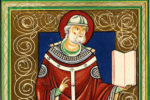
None of us have experience in living under quarantine before, so we are all figuring out how to do it. The pace of life has slowed down, evenings are empty, and we have a lot more free time. How should…

The coronavirus pandemic has everyone on edge, with many worried about the future. We all wonder what the future contains. These are interesting times, but a historical perspective will help us to better understand the significance of the present. This…

David, king of Judah and Israel, is one of the most significant people in the entire Bible. His reign shaped the entire nation of Israel, and Jesus himself is known as the ‘Son of David.’

If you are concerned about the state of our nation, then I’m writing for you. America is in grave danger, but there is still time to save our Republic.

http://media.blubrry.com/timothytalks/fromdanielsdesk.com/wp-content/uploads/2020/03/Podcast-Update.mp3Podcast: Play in new window | DownloadSubscribe: RSSThis quick update will explain more about why the Timothy Talks show is going to change from a regular bi-weekly schedule.

Paul’s epistle to the Ephesians is brimming with architectural language. In Ephesians 2:21 he refers to a temple that is built by God. How much of the letter to the Ephesians is actually a reference to God’s Temple? And was the apostle thinking of the Ephesian Temple of Artemis as he penned this letter?

Gregory the Great has much to teach modern audiences about leadership. The church needs more leaders like Gregory commended: discerning servants who remain active ascetics.

Last year, from June 9-28, I toured the great cities of Italy. It was a unique opportunity to visit the most famous places in world history. Along the way, I developed a deeper understanding of the ancient world, including the time of the New Testament.

It is important to understand Critical Race Theory because it occupies such an important part of modern discourse. By understanding CRT, its core tenets, and the critiques of this theory, you will be better able to engage with others in discussions about this influential and unique theory.




